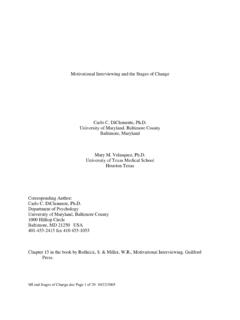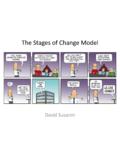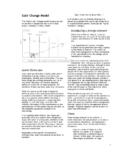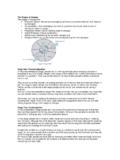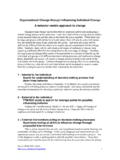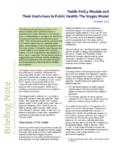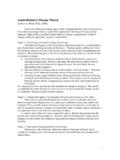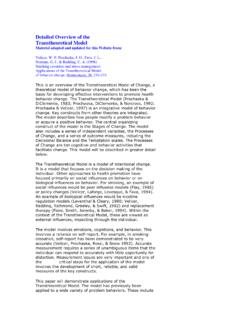Transcription of Stages of Change Model - nfsrecovery.org
1 Stages of Change Model By Marc F. Kern Published 04/19/2008 Before you begin to make changes in your life, I would like to introduce you to a useful theory -- called the Stages of Change Model , or SCM -- about the mind/body Stages we go through when we do Change . The Stages of Change Model was originally developed in the late 1970 s and early 1980 s by James Prochaska and Carlo DiClemente at the University of Rhode Island when they were studying how smokers were able to give up their habits or addiction. The SCM Model has been applied to a broad range of behaviors including weight loss, injury prevention, overcoming alcohol, and drug problems among others.
2 The idea behind the SCM is that behavior Change does not happen in one step. Rather, people tend to progress through different Stages on their way to successful Change . Also, each of us progresses through the Stages at our own rate. So expecting behavior Change by simply telling someone, for example, who is still in the "pre-contemplation" stage that he or she must go to a certain number of AA meetings in a certain time period is rather naive (and perhaps counterproductive) because they are not ready to Change . Each person must decide for himself or herself when a stage is completed and when it is time to move on to the next stage .
3 Moreover, this decision must come from the inside you (see developing an internal locus of control) -- stable, long term Change cannot be externally imposed. In each of the Stages , a person has to grapple with a different set of issues and tasks that relate to changing behavior. The Stages of Change The Stages of Change are: Precontemplation (Not yet acknowledging that there is a problem behavior that needs to be changed) Contemplation (Acknowledging that there is a problem but not yet ready or sure of wanting to make a Change ) Preparation/Determination (Getting ready to Change ) Action/Willpower (Changing behavior) Maintenance (Maintaining the behavior Change ) and Relapse (Returning to older behaviors and abandoning the new changes) stage One.
4 Precontemplation In the precontemplation stage , people are not thinking seriously about changing and are not interested in any kind of help. People in this stage tend to defend their current bad habit(s) and do not feel it is a problem. They may be defensive in the face of other people s efforts to pressure them to quit. They do not focus their attention on quitting and tend not to discuss their bad habit with others. In AA, this stage is called denial, but at Addiction Alternatives, we do not like to use that term. Rather, we like to think that in this stage people just do not yet see themselves as having a problem.
5 Are you in the precontemplation stage ? No, because the fact that you are reading this shows that you are already ready to consider that you may have a problem with one or more bad habits. (Of course, you may be reading this because you have a loved one who is still in the pre-contemplation stage . If this is the case, keep reading for suggestions about how you can help others progress through their Stages of Change ) stage Two: Contemplation In the contemplation stage people are more aware of the personal consequences of their bad habit and they spend time thinking about their problem.
6 Although they are able to consider the possibility of changing, they tend to be ambivalent about it. In this stage , people are on a teeter-totter, weighing the pros and cons of quitting or modifying their behavior. Although they think about the negative aspects of their bad habit and the positives associated with giving it up (or reducing), they may doubt that the long-term benefits associated with quitting will outweigh the short-term costs. It might take as little as a couple weeks or as long as a lifetime to get through the contemplation stage .
7 (In fact, some people think and think and think about giving up their bad habit and may die never having gotten beyond this stage ) On the plus side, people are more open to receiving information about their bad habit, and more likely to actually use educational interventions and reflect on their own feelings and thoughts concerning their bad habit. stage Three: Preparation/Determination In the preparation/determination stage , people have made a commitment to make a Change . Their motivation for changing is reflected by statements such as: I ve got to do something about this - this is serious.
8 Something has to Change . What can I do? This is sort of a research phase: people are now taking small steps toward cessation. They are trying to gather information (sometimes by reading things like this) about what they will need to do to Change their behavior. Or they will call a lot of clinics, trying to find out what strategies and resources are available to help them in their attempt. Too often, people skip this stage : they try to move directly from contemplation into action and fall flat on their faces because they haven t adequately researched or accepted what it is going to take to make this major lifestyle Change .
9 stage Four: Action This is the stage where people believe they have the ability to Change their behavior and are actively involved in taking steps to Change their bad behavior by using a variety of different techniques. This is the shortest of all the Stages . The amount of time people spend in action varies. It generally lasts about 6 months, but it can literally be as short as one hour! This is a stage when people most depend on their own willpower. They are making overt efforts to quit or Change the behavior and are at greatest risk for relapse.
10 Mentally, they review their commitment to themselves and develop plans to deal with both personal and external pressures that may lead to slips. They may use short-term rewards to sustain their motivation, and analyze their behavior Change efforts in a way that enhances their self-confidence. People in this stage also tend to be open to receiving help and are also likely to seek support from others (a very important element). Hopefully, people will then move to: stage Five: Maintenance Maintenance involves being able to successfully avoid any temptations to return to the bad habit.
